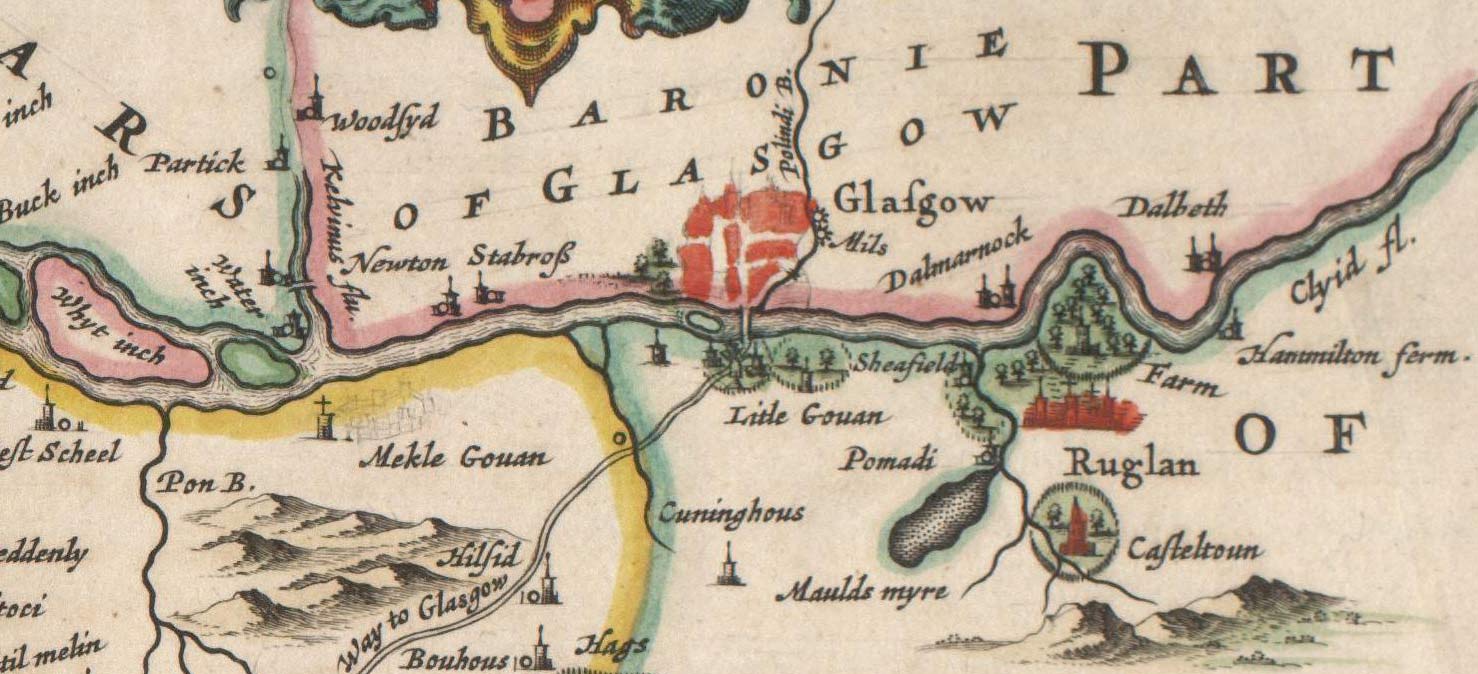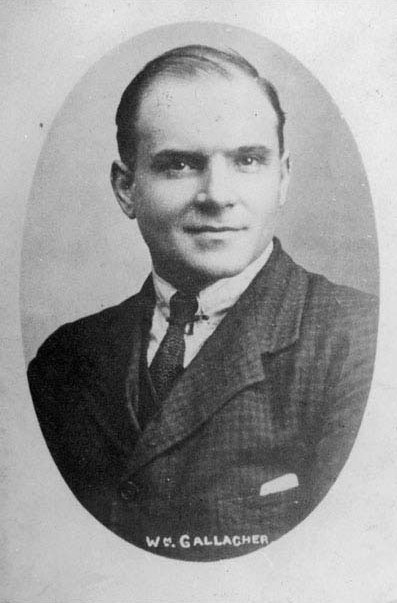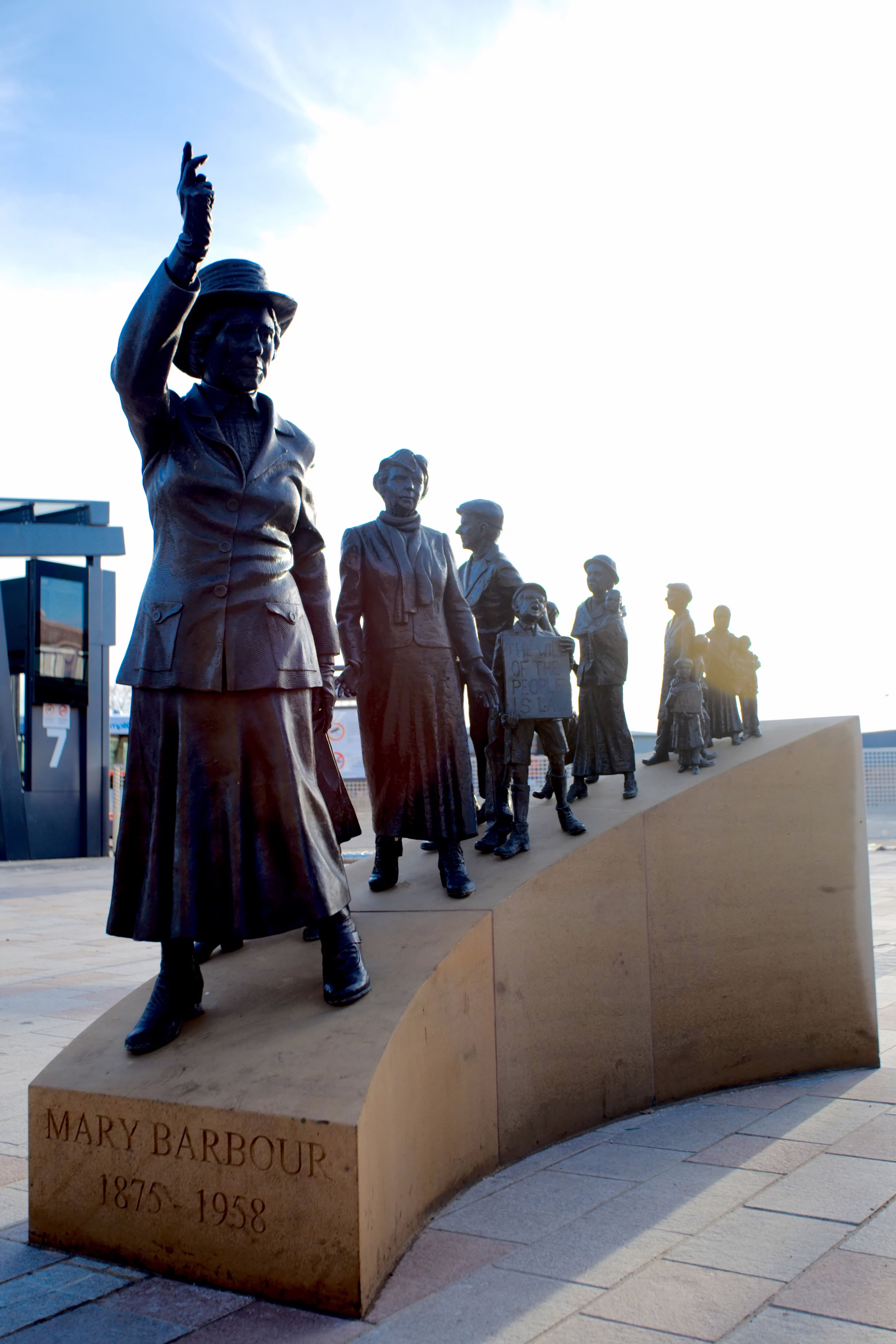|
South Govan Women's Housing Association
South Govan Women's Housing Association was established in 1915 under the leadership by Mary Barbour in Govan on the south side of Glasgow in Scotland. The Glasgow Rent strikes began in response to rent increases in Glasgow during the First World War. Many thought the landlords in Glasgow were taking advantage of households whose men were away fighting as part of the war effort; thus, working-class women formed tenants associations such as the South Govan Women's Housing Association. Led by Helen Crawfurd, Mary Barbour, Agnes Dollan and Jessie Stephen Jessie Stephen, Order of the British Empire, MBE (19 April 1893 12 June 1979) was a twentieth-century British suffragette, labour activist and local councillor. She grew up in Scotland and won a scholarship to train as a teacher. Family financ ..., the South Govan Women's Housing Association sought to prevent evictions from tenants who could not afford the rent increase and campaigned for subsidized housing. Their efforts led ... [...More Info...] [...Related Items...] OR: [Wikipedia] [Google] [Baidu] |
Mary Barbour
Mary Barbour ( Rough; 20 February 1875 – 2 April 1958) was a Scotland, Scottish Activism, political activist, local councillor, bailie and magistrate. Barbour was closely associated with the Red Clydeside movement in the early 20th century and especially for her role as the main organiser of the women of Govan who took part in the rent strikes of 1915.Audrey Canning, ‘Barbour , Mary (1875–1958)’, Oxford Dictionary of National Biography, Oxford University Press, 2004; online edn, May 200accessed 14 Feb 2014/ref> The protesters became known as "Mrs Barbour's Army". She was also a founder of the The Women's Peace Crusade, Women's Peace Crusade. She stood as a Labour Party (UK), Labour candidate and was elected to Glasgow Town Council in 1920, representing the Fairfield, Glasgow, Fairfield ward in Govan. She was one of the first female councillors in the city. She was also one of the first female Bailie, bailies of Glasgow Corporation. She advocated for the provision of wom ... [...More Info...] [...Related Items...] OR: [Wikipedia] [Google] [Baidu] |
Govan
Govan ( ; Cumbric: ''Gwovan''; Scots language, Scots: ''Gouan''; Scottish Gaelic: ''Baile a' Ghobhainn'') is a district, parish, and former burgh now part of southwest Glasgow, Scotland. It is situated west of Glasgow city centre, on the south bank of the River Clyde, opposite the mouth of the River Kelvin and the district of Partick. Historically it was part of the Lanarkshire, County of Lanark. In the early medieval period, the site of the present Govan Old Parish Church, Govan Old churchyard was established as a Christian centre for the Brittonic Peoples, Brittonic Kingdom of Alt Clut (Dumbarton Rock) and its successor realm, the Kingdom of Strathclyde. This latter kingdom, established in the aftermath of the Viking siege and capture of Alt Clut by Vikings from Dublin in 870, created the stone sculptures known today as the The Govan Stones, Govan Stones. Govan was the site of a ford and later a ferry which linked the area with Partick for seasonal cattle drovers. In the ei ... [...More Info...] [...Related Items...] OR: [Wikipedia] [Google] [Baidu] |
Glasgow
Glasgow is the Cities of Scotland, most populous city in Scotland, located on the banks of the River Clyde in Strathclyde, west central Scotland. It is the List of cities in the United Kingdom, third-most-populous city in the United Kingdom and the 27th-most-populous city in Europe, and comprises Wards of Glasgow, 23 wards which represent the areas of the city within Glasgow City Council. Glasgow is a leading city in Scotland for finance, shopping, industry, culture and fashion, and was commonly referred to as the "second city of the British Empire" for much of the Victorian era, Victorian and Edwardian eras. In , it had an estimated population as a defined locality of . More than 1,000,000 people live in the Greater Glasgow contiguous urban area, while the wider Glasgow City Region is home to more than 1,800,000 people (its defined functional urban area total was almost the same in 2020), around a third of Scotland's population. The city has a population density of 3,562 p ... [...More Info...] [...Related Items...] OR: [Wikipedia] [Google] [Baidu] |
Glasgow Rent Strikes 1915
Red Clydeside was an era of political radicalism in Glasgow, Scotland, from the 1910s until the early 1930s. It also referred to the area around the city on the banks of the River Clyde, such as Clydebank, Greenock, Dumbarton and Paisley. Red Clydeside is a significant part of the history of the labour movement in Scotland and Britain as a whole. Some newspapers of the time used the term "Red Clydeside" in a derogatory manner, to refer to the groundswell of popular and political radicalism that had erupted in Scotland. A confluence of charismatic individuals, organised movements, and socio-political forces gave rise to Red Clydeside, which had its roots in working-class opposition to Britain's participation in the First World War. The region had a long history of political radicalism dating back to the Society of the Friends of the People and the "Radical War" of 1820. 1911 strike at Singer The 11,000 workers at the largest Singer sewing machine factory in Clydebank went on ... [...More Info...] [...Related Items...] OR: [Wikipedia] [Google] [Baidu] |
Helen Crawfurd
Helen Crawfurd ( Jack, later Anderson; 9 November 1877 – 18 April 1954) was a Scottish suffragette, rent strike organiser, Communist activist and politician. Born in Glasgow, she was brought up there and in London. Biography Born Helen Jack at 175 Cumberland Street in the Gorbals area of Glasgow, her parents were Helen L. ( Kyle) and William Jack. Her mother worked a steam-loom before she wed. Helen's family moved to Ipswich while she was young. Crawfurd later went to school in London and Ipswich before moving back to Glasgow as a teenager. Crawfurd's father, a master baker, was a Catholic, but converted to the Church of Scotland and became a conservative trade unionist. Initially religious herself and a Sunday School teacher, Crawfurd felt a call to be married at 21 to the 67-year-old widower Alexander Montgomerie Crawfurd (29 August 1828 – 31 May 1914), a Church of Scotland minister and family friend. However, she became increasingly radical, after witnessing injustices, ... [...More Info...] [...Related Items...] OR: [Wikipedia] [Google] [Baidu] |
Agnes Dollan
Agnes Johnston Dollan MBE ( Moir; 16 August 1887 – 16 July 1966), also known as Agnes, Lady Dollan, was a Scottish suffragette and political activist. She was a leading campaigner during the Glasgow Rent Strikes, and a founding organiser of the Women's Peace Crusade. In 1919, she was the first woman selected by the Labour party to stand for election to Glasgow Town Council, and later became Lady Provost of Glasgow. Early life Dollan was born on Springburn Road in Springburn, Glasgow on 16 August 1887 to Anne Wilkinson and Henry Moir, a blacksmith in the locomotive works. She was one of eleven children. Dollan attended school locally until the age of eleven before being forced to leave due to family poverty. Dollan also attended the Socialist Sunday Schools, where she "graduated as a Socialist". On leaving school, Dollan went first to work in a factory before becoming a Post Office telephone operator. During this latter job, Dollan joined the Women's Labour League ... [...More Info...] [...Related Items...] OR: [Wikipedia] [Google] [Baidu] |
Jessie Stephen
Jessie Stephen, Order of the British Empire, MBE (19 April 1893 12 June 1979) was a twentieth-century British suffragette, labour activist and local councillor. She grew up in Scotland and won a scholarship to train as a teacher. Family finances dictated otherwise, leading to her becoming a domestic worker at the age of 15. She became involved in national labour issues as a teenager, via organisations such as the Independent Labour Party and the Women's Social and Political Union. Stephen moved to London during World War I and in the 1920s she toured the United States and Canada, where she held meetings with the public including migrant English domestic workers. Stephen was elected as a local councillor several times and stood as a candidate in general elections. After moving to Bristol in the 1940s she became the first woman president of Bristol Trades Council. She was appointed MBE in 1977 and her life is commemorated by a blue plaque in Bristol. Biography Stephen is reco ... [...More Info...] [...Related Items...] OR: [Wikipedia] [Google] [Baidu] |
Red Clydeside
Red Clydeside was an era of political radicalism in Glasgow, Scotland, from the 1910s until the early 1930s. It also referred to the area around the city on the banks of the River Clyde, such as Clydebank, Greenock, Dumbarton and Paisley. Red Clydeside is a significant part of the history of the labour movement in Scotland and Britain as a whole. Some newspapers of the time used the term "Red Clydeside" in a derogatory manner, to refer to the groundswell of popular and political radicalism that had erupted in Scotland. A confluence of charismatic individuals, organised movements, and socio-political forces gave rise to Red Clydeside, which had its roots in working-class opposition to Britain's participation in the First World War. The region had a long history of political radicalism dating back to the Society of the Friends of the People and the "Radical War" of 1820. 1911 strike at Singer The 11,000 workers at the largest Singer sewing machine factory in Clydebank went on ... [...More Info...] [...Related Items...] OR: [Wikipedia] [Google] [Baidu] |
Organizations Established In 1915
An organization or organisation (Commonwealth English; see spelling differences) is an entity—such as a company, or corporation or an institution (formal organization), or an association—comprising one or more people and having a particular purpose. Organizations may also operate secretly or illegally in the case of secret societies, criminal organizations, and resistance movements. And in some cases may have obstacles from other organizations (e.g.: MLK's organization). What makes an organization recognized by the government is either filling out incorporation or recognition in the form of either societal pressure (e.g.: Advocacy group), causing concerns (e.g.: Resistance movement) or being considered the spokesperson of a group of people subject to negotiation (e.g.: the Polisario Front being recognized as the sole representative of the Sahrawi people and forming a partially recognized state.) Compare the concept of social groups, which may include non-organiza ... [...More Info...] [...Related Items...] OR: [Wikipedia] [Google] [Baidu] |
1915 Establishments In Scotland
Events Below, the events of World War I have the "WWI" prefix. January *January – British physicist Sir Joseph Larmor publishes his observations on "The Influence of Local Atmospheric Cooling on Astronomical Refraction". *January 1 ** WWI: British Royal Navy battleship HMS Formidable (1898), HMS ''Formidable'' is sunk off Lyme Regis, Dorset, England, by an Imperial German Navy U-boat, with the loss of 547 crew. **WWI: Battle of Broken Hill: A train ambush near Broken Hill, Australia, is carried out by two men (claiming to be in support of the Ottoman Empire) who are killed, together with four civilians. * January 5 – Joseph E. Carberry sets an altitude record of , carrying Capt. Benjamin Delahauf Foulois as a passenger, in a fixed-wing aircraft. * January 12 ** The United States House of Representatives rejects a proposal to give women the right to vote. ** ''A Fool There Was (1915 film), A Fool There Was'' premières in the United States, starring Theda Bara as a '' ... [...More Info...] [...Related Items...] OR: [Wikipedia] [Google] [Baidu] |
Organisations Based In Glasgow
An organization or organisation (Commonwealth English; see spelling differences) is an entity—such as a company, or corporation or an institution (formal organization), or an association—comprising one or more people and having a particular purpose. Organizations may also operate secretly or illegally in the case of secret societies, criminal organizations, and resistance movements. And in some cases may have obstacles from other organizations (e.g.: MLK's organization). What makes an organization recognized by the government is either filling out incorporation or recognition in the form of either societal pressure (e.g.: Advocacy group), causing concerns (e.g.: Resistance movement) or being considered the spokesperson of a group of people subject to negotiation (e.g.: the Polisario Front being recognized as the sole representative of the Sahrawi people and forming a partially recognized state.) Compare the concept of social groups, which may include non-organiza ... [...More Info...] [...Related Items...] OR: [Wikipedia] [Google] [Baidu] |








